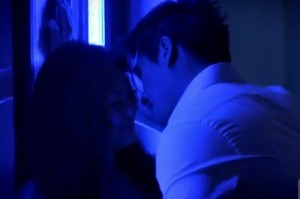It’s been two years (almost to the day) since the announcement that Tyrese Gibson’s production company announced its intention to collaborate with the team behind reality television bonanzas Jersey Shore and The Hills to create an Asian American-centered reality TV show set in the night-life of L.A.’s infamous Koreatown. K-town, as its known by some, rivals the Jersey Shore for its wild after-hour party scene and was introduced to the MTV generation as the backdrop against which Far East Movement set its music video for “Like a G6”.
httpv://www.youtube.com/watch?v=w4s6H4ku6ZY
Seems like the perfect setting for a group of twenty-something Asian Americans to prove that they can match the Jersey Shore cast fist pump to fist pump. K Town announced its 8 cast members in July of 2010, along with the release of behind-the-scenes photos of the show’s first week of shooting; this was followed soon afterwards with TMZ “leaking” a compilation of casting videos.
And then… nothing.
Although Asian America waited with bated breath for K Town — which was anticipated to be picked up by MTV — to air, the show instead quietly fell off the radar. Eventually, we chalked it up as just another failed project that woulda shoulda coula headlined Asian Americans. We figured it was probably just another symptom of our community always being the bridesmaid and never the bride.
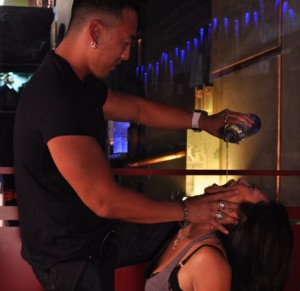
And then, this past week, K Town rather unexpectedly revealed its first episode. Jeff Yang gives us the skinny on his latest Tao Jones column:
“Once we started shopping [K Town] around town, we got interest everywhere we went. There was a bidding war between two networks, and we went with one of them,” [says Executive Producer Mike Le, who is also vice president of Tyrese Gibson’s HQ Production company].
And then? “And then things didn’t work out.”
According to Le, a combination of “regime change” and a refusal by the net’s new guard to let the producers make the show they’d had in mind led to the show going on an extended hiatus — one that as of last Wednesday, had lasted almost two and a half years. That’s when the first episode of the new, no-holds-barred online edition of K-Town was unveiled, as the tentpole property of LOUD, a newly launched YouTube channel from equally new startup Electus.
Here’s episode 1 of K Town:
httpv://www.youtube.com/watch?v=2rhDjxDLyjk
For those of you too lazy to watch the full 12 minutes, here’s the skinny. Episode 1 of K Town is almost anti-climatic in its lack of hyper-sexed drunken debauchery. After nearly two full years of anticipation and hype, episode 1 spends most of its time introducing us to the cast and some of the inherent drama. This is pretty much par for the course for any reality TV show, and is akin to that first wasted hour of any Real World season where we follow each cast mate as they get off the plane and are whisked off to staged introductions with one another. Episode 1 is 12 minutes long — we really can’t expect any fireworks this soon.
But, have no fear, K Town fanatics — Le warns that episode 2 will blow the wheels off of episode 1. Writes Yang:
“The first episode, we spent quite a bit of time just setting up the players, but beginning with the next episode on, you better hold onto your seats, because we’re going from 60 m.p.h. to 250. All the Asian Americans out there who are afraid this show is going to be too wild, well, their fears are justified,” [says Le].
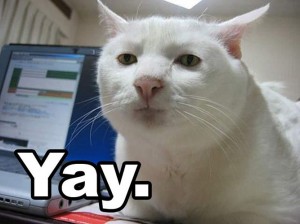
***
In Episode 1, we are introduced to the cast. Two years ago, I made some wild guesses about the characters they would play on K Town based on some leaked behind-the-scene photos, a little revised after I saw the casting video). Let’s see how close I was:
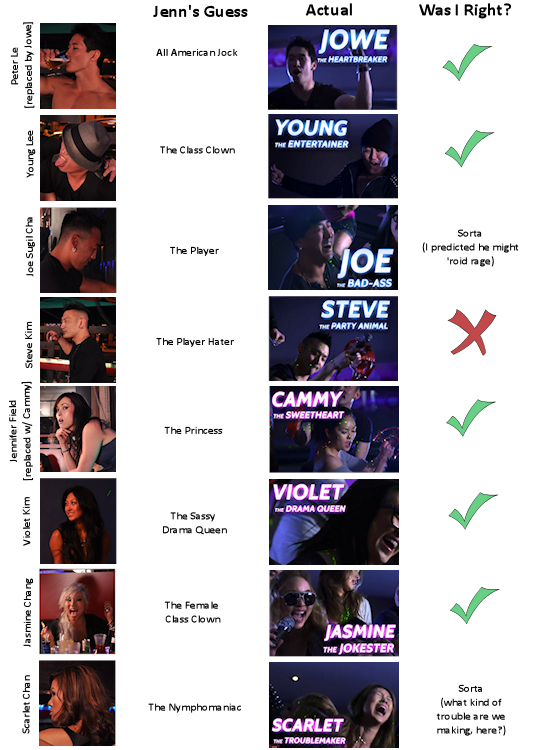
In Episode 1, we meet the cast. Jasmine (who is ridiculously adorable and charming) is an (“award-winning”) hair-stylist who has been friends with Scarlet for awhile, and the latter has just moved to K-Town. Violet is also their friend, and has lived and partied in K-Town since she was a kid. She’s a single mother (Jeff notes that Violet is a former junior beauty queen pageant contestant who married at age 21) who has been on the K-Town club scene since she was a kid.
As for the guys: Joe is a club promoter at the Belasco, who also spends most of his time at the gym; he clearly looks the part of the personal trainer, but eeek, dude, you’re leaning a little heavy into those rope pull-downs! Joe also seems like a genuinely nice guy, and I did enjoy his “motivation” of the other guys. As for the other boys, there’s Young, a dancer and aspiring “entertainer”, and Steve who, well, in his own words:
“I live by one motto: work hard, and drink harder, and show your loves to women, man.”
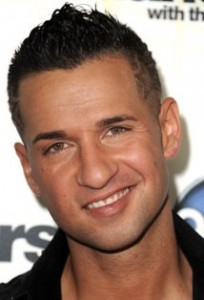
We learn through the course of episode 1 that Violet and Jowe, the self-proclaimed “Prince of K-Town” (whom we meet later in the episode), had a short relationship prior to the start of shooting, but that they have since broken up. This is clearly going to serve as a major story arc over the season.
Joe organizes a get-together for the 7 castmates (we haven’t met Cammy yet) to announce that he needs their help to promote a huge party at the Belasco (or he could get fired!), and so that Young can announce that he got engaged to a girl who had to return to Korea after her visa expired.
(Aside, I realize that Young wants to be an “entertainer” but I really hope he’s not planning a career as a comedian. In the confessional, he jokes: “What’s funny is my name is Young and her name is So Young!” *frenzied laughter*… I’m sorry, sweetie, but that’s not really that funny.)
And, in true manufactured reality TV drama fashion, Joe doesn’t tell Violet that he has invited Jowe to show up (which he does, all late like a crackhead). As Jowe greets the other cast-mates, the camera is trained dead on Violet’s reaction.
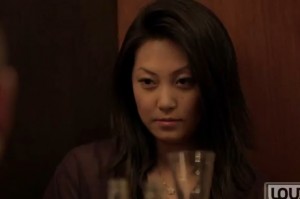
That was seriously a bitchy ass thing for whomever (Joe? K-Town producers?) to do. But, hey, it makes for good TV, right?
The episode ends with a strained truce called between Violet and Jowe after the rest of the castmates leave, and foreshadowing for next week’s episode, which will cover the party at Belasco later that night (corrected).
***
In Jeff’s Tao Jones piece, Jeff touches upon the purpose of K Town:
“High-impact” and “buzz-worthy” seem like apt terms to describe K-Town — now dubbed “the reality show no TV network could show you.” The show’s teaser trailer features epileptic flashes of castmembers bootyshaking in their lingerie, licking liquor off one anothers’ bodies, tongue-tangling and pelvis-grinding in various gender combinations and drunkenly punching each other senseless — in short, engaging in activities that are not commonly associated with Asian Americans in mainstream media.
And that, says Mike Le, is the point.
“I think we as Asians have a tendency to embrace our own ‘model minority’ hype,” he says. “To me, that one-dimensional, positive stereotype is as bad as the images in the mass media that depict us only as ninjas or dragon ladies or asexual IT guys. Yes, the interest in the show is Asians going wild — you better believe that when we took it around to the networks, the old white execs we showed it to were popping their eyes out. But in reality, K-Town’s about the fact that all the stereotypes, good or bad, don’t fit when you’re talking about real people. Our cast doesn’t represent all Asians. They simply represent themselves.”
The desire to present a more three-dimensional image of Asian Americans on TV, as a direct challenge to the stereotypes that are traditionally embodied by Hollywood’s Asian faces, appeals to the Asian American community. Indeed, when K Town was slated to air on a major TV network such as MTV, I could rationalize the need for a show like K Town; less than 3% of primetime TV’s main characters are played by Asian American actors, and most embody a classic Asian American stereotype. A show like K Town being aired on MTV alongside images of Asian Americans as doctors, scientists, and IT specialists could help to provide a more complex, humanized image of Asian Americana.
However, the argument becomes less compelling given K Town‘s new iteration as an online TV show. Unlike cable TV, the Internet is not only well-trafficked (and thus well-represented by) Asian American users — but is also a place where one can readily find examples of Asians and Asian Americans as spoken word artists, musicians, rap battlers, dancers, and yes, even liquored-up fist-pumpers. The Internet is a place where Asians and Asian Americans displayed art, screened movies, created comic books, got angry, built a political voice, and even lip synced to the Backstreet Boys.
One wonders how K Town can really help to diversify the Asian American image in this medium? Or should we just be straight with ourselves? Maybe we should just stop trying to put K Town into some larger sociopolitical context where it’s something special because it “challenges stereotypes”.
Maybe K Town is best being treated for exactly what it is: yet another trashy reality TV show that we’ll indulge in because, goddammit, we just can’t get enough of our guilty pleasures.
